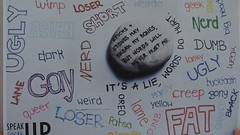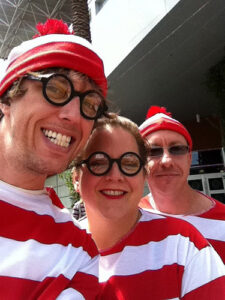Someone made a comment on a blog post I wrote about the importance of having a social media policy at work:
I posted something to my FB page not mentioning any names or directed at anyone in particular. It was also vague on subject. Today my supervisor brought a printed picture of it to me because apparently someone saw it and thought it was about them. It has nothing to do with them or work. Can he control what I say on my own page especially if it makes no reference to specific people or work or subjects?
I have two thoughts in response to this comment:
1. To the upset coworker: Don’t assume every vague post on the internet is about you.
2. To the commenter: Why are you making posts that are so ambiguous that there is confusing what message you’re attempting to convey?

Here’s my rule for myself:
- If you have something to say, say it.
- Otherwise, keep your thoughts to yourself.
- If what you want to post is so unclear that the reader cannot discern who or what you’re talking about, you’re essentially making noise.
- It’s ok to be quiet.
My mentor Rocky instilled a strong sense of integrity in me and my teammates. He taught us to be willing own what we say in every situation – don’t lie and don’t hide the ball. He was not always gracious with his words, but everyone around him knew where he stood. His lessons on integrity formed the basis for my personal rules about what I post on social media – I’ll own anything I’ve posted in any situation.
By being succinct and direct, posts have more impact. It’s possible to take an opposing view without calling out a specific person – like my fervent posts about people who don’t return their shopping carts and how people who don’t vote forfeit their right to bitch.
Post with integrity. If I’m tempted to be nebulous about what I’m trying to say because of potential repercussions, that’s a sign to keep my thoughts to myself.
“Nothing pays off like restraint of tongue and pen,†and keyboard.
Tomorrow’s post will present the flip-side view: Don’t assume everything you read online is about you.

